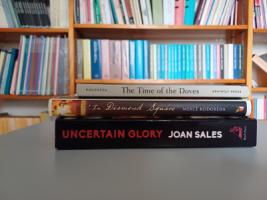Why do your students learn Catalan? This a question I am often asked when I am back home, which is probably the exact same question students learning Catalan outside the Catalan-speaking areas are used to. My answer to this question depends on the mood I am in. Most times I take the more formal path by explaining that Catalan is an optional subject in the Faculty of Medieval and Modern Languages, which is usually taken by students who major in Spanish and/or Linguistics, and who would like to spend their year abroad in an area where this language is spoken. However, these courses are an opportunity to learn another interesting Romance language, so an add-on to that answer is: and why not?

Students at Oxford tend to be shy at first. When they are asked what they know about Catalan during the very first session, their answers tend to be purely linguistic and something close to “it is a mix of Spanish and French”. Although it is true that having a good command of other Romance languages helps with the process of learning Catalan, as we constantly contrast grammar structures and employ inter-comprehension techniques in order to use the students’ previous knowledge to make connections between languages, their answers from week 1 change completely by the time we reach week 8. The more they are in contact with the language, the deeper their understanding of its specifics becomes.
I personally think that Catalan is an excellent option for both polyglots and literature lovers. Since Catalan courses are optional at the University of Oxford, all university members are welcome to join the classes. This means that a mix of students of any level (undergraduate and graduate) and university staff share the same class, which is an enriching experience for everyone.
Besides the linguistic side to the courses, the Catalan programme at Oxford includes literature and translation courses, and oral skills lessons where cultural aspects are introduced with viewings of excerpts from real TV programmes, discovery of the Catalan music scene and reading of poetry and other literary works. This panoramic view of Catalan culture and tradition is available for all students, but for those who wish to include Catalan-related topics in their Final Honour School examinations, they have the possibility to choose Catalan prose and/or poetry as part of paper VIII, as well as Catalan contemporary literature or Catalan Linguistics in Paper XII and Paper XIV Extended Essay.

Thanks to the collaboration with Institut Ramon Llull, which is the institution coordinating Catalan Studies abroad, there are other extracurricular learning activities organised together with other UK universities such as the bilingual English-Catalan online talk with Catalan cinema protagonists or the tandem partners organised in collaboration with the Universitat de Barcelona. Moreover, our students have the opportunity to participate in fully immersive linguistic stays in different Catalan-speaking territories over the summer, organised and funded by Institut Ramon Llull, and they can also take the official language examination from A2 to C2 in different cities all over the world, one of those being Oxford.
The Oxford Catalan linguistic community is also lively and vibrant. We organise Catalan Linguistics at Oxford, an annual one-day conference with linguists from all over Europe to discuss different newly-arisen issues on Catalan linguistics from various perspectives, as well as an informal celebration of Sant Jordi, the day of books and roses celebrated every 23rd of April to commemorate both Catalan literature and love. Both events take place during Trinity Term and everyone is welcome to join.
Talking about love, Catalan is a language which attracts not only language lovers or linguistics enthusiasts, but also people who get into the language through their love for a Catalan author, tradition or city. Fortunately, Catalan at Oxford gives them the chance to continue being in contact with the language in the city where they live and study.
